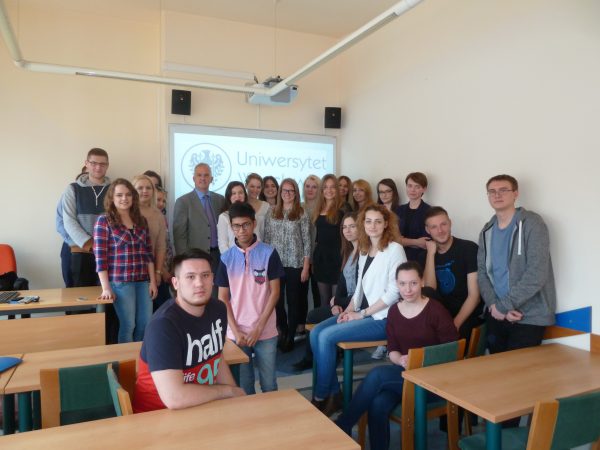
The University set up a conference about:“Protection of fundamental Rights – new challenges for the EU” for Master and PhD students.
“As a former MEP I was invited to speak to several different groups of students around a general theme […]. At the time of my visit and as I write this report, the United Kingdom is absorbed in the Referendum campaign […]Despite my best efforts to keep to the topic on the agenda, the students always and without exception, brought discussions back to the British question. […]I met with students studying EU competition law, Diplomatic and consular law, the Institutions of the EU and PHD students, from all of whom I had a warm and friendly welcome. Professor Dagmara Kornobis- Romanowska from the John Monnet Team was my host and I am most grateful for her hospitality and friendship and for all the organisation.”
Robert EVANS, FMA Member, participated in this event.
Mission report: WROCŁAW A CITY WITH A TURBULENT PAST
It is said there are over one hundred bridges that span the River Oder in Wrocław. The city has had such a turbulent past that each bridge could easily represent one major change. Today Wroclaw’s a city of some six hundred thousand people with the largest university in the region, teaching over 40,000 students and around 1300 doctoral students in 10 different Faculties. 9000 students graduate from the University of Wroclaw every year. In the past, Wrocław has been occupied by Poles, Czechs, Austrians, Hungarians and Germans. Over the years, settlers here have included Walloons, Jews, Italians and Ruthenians. This mixture of different religions and cultures, whilst problematic at times, has also helped shape the Wroclaw of 2016. When the Nazis seized power in 1933 the remaining Polish people were driven out and Breslau as it was now called became Hitler’s last stronghold. After a fourteen week siege the city finally surrendered to the Soviets, on May 6th 1945. At Potsdam, after the war, Poland regained Wroclaw as the new frontiers of Poland moved the country westwards. The remaining German residents were expelled and the city was re-populated by Poles from Lwow (now the Ukranian town of Lviv), which became part of the Soviet Union, Wilno (now the Lithuanian town of Vilnius) as well as many new arrivals from Warsaw and Poznan. The ‘pioneers’ resettled a foreign city that was almost threequarters destroyed.
Thanks to some Polish professors from Lvov, teaching and research activities at the University of Wroclaw also restarted and today the university is well funded and thriving with an emphasis on scientific research. True to the city’s history there are students from hundreds of different backgrounds and probably one hundred different countries. As a former MEP I was invited to speak to several different groups of students around a general theme of ‘Protection of Fundamental Rights – new challenges for the European Union’. At the time of my visit and as I write this report, the United Kingdom is absorbed in the Referendum campaign as to whether or not the UK should stay a member of the European Union. Despite my best efforts to keep to the topic on the agenda, the students always and without exception, brought discussions back to the British question.
The UK joined the then EEC in 1973 and has been a full and important member ever since. Of course, the UK has never signed up to the Euro or the Schengen Agreement and as such has often seemed a semidetached member of the European Union. Quite apart from our position as a key trading nation, from the English language to the whole historical and cultural aspects, the EU is stronger with the UK as a member and the UK similar is stronger in. I met with students studying EU competition law, Diplomatic and consular law, the Institutions of the EU and PHD students, from all of whom I had a warm and friendly welcome. Professor Dagmara Kornobis- Romanowska from the John Monnet Team was my host and I am most grateful for her hospitality and friendship and for all the organisation. I hope the next one hundred years in the history of Wroclaw and itsuniversity is somewhat less turbulent!

